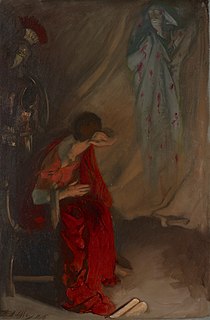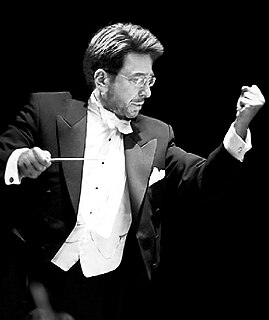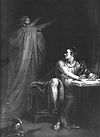Related Research Articles

Johannes Brahms was a German composer, pianist, and conductor of the mid-Romantic period. Born in Hamburg into a Lutheran family, he spent much of his professional life in Vienna. He is sometimes grouped with Johann Sebastian Bach and Ludwig van Beethoven as one of the "Three Bs" of music, a comment originally made by the nineteenth-century conductor Hans von Bülow.
Overture in music was originally the instrumental introduction to a ballet, opera, or oratorio in the 17th century. During the early Romantic era, composers such as Beethoven and Mendelssohn composed overtures which were independent, self-existing instrumental, programmatic works that foreshadowed genres such as the symphonic poem. These were "at first undoubtedly intended to be played at the head of a programme".

Robert Schumann was a German composer, pianist, and influential music critic. He is widely regarded as one of the greatest composers of the Romantic era. Schumann left the study of law, intending to pursue a career as a virtuoso pianist. His teacher, Friedrich Wieck, a German pianist, had assured him that he could become the finest pianist in Europe, but a hand injury ended this dream. Schumann then focused his musical energies on composing.

Clara Josephine Schumann was a German pianist, composer, and piano teacher. Regarded as one of the most distinguished pianists of the Romantic era, she exerted her influence over the course of a 61-year concert career, changing the format and repertoire of the piano recital by lessening the importance of purely virtuosic works. She also composed solo piano pieces, a piano concerto, chamber music, choral pieces, and songs.

The Tragedy of Julius Caesar (First Folio title: The Tragedie of Ivlivs Cæsar) is a history play and tragedy by William Shakespeare first performed in 1599.
Incidental music is music in a play, television program, radio program, video game, or some other presentation form that is not primarily musical. The term is less frequently applied to film music, with such music being referred to instead as the film score or soundtrack.

Joseph Joachim was a Hungarian violinist, conductor, composer and teacher who made an international career, based in Hanover and Berlin. A close collaborator of Johannes Brahms, he is widely regarded as one of the most significant violinists of the 19th century.

Freiherr Hans Guido von Bülow was a German conductor, virtuoso pianist, and composer of the Romantic era. As one of the most distinguished conductors of the 19th century, his activity was critical for establishing the successes of several major composers of the time, especially Richard Wagner and Johannes Brahms. Alongside Carl Tausig, Bülow was perhaps the most prominent of the early students of the Hungarian composer, virtuoso pianist and conductor Franz Liszt; he gave the first public performance of Liszt's Sonata in B minor in 1857. He became acquainted with, fell in love with and eventually married Liszt's daughter Cosima, who later left him for Wagner. Noted for his interpretation of the works of Ludwig van Beethoven, he was one of the earliest European musicians to tour the United States.

The Violin Sonata No. 1 in A minor, Op. 105 of Robert Schumann was written the week of 12– 16 September 1851. Schumann was reported to have expressed displeasure with the work. This was also the year of the premiere of the Rhenish symphony, and among compositions the substantial revision of the Fourth Symphony, the Third Piano Trio, the oratorio Der Rose Pilgerfahrt, a number of piano works and two of his concert overtures, Julius Caesar and Hermann und Dorothea after Goethe.

Egmont is a play by Johann Wolfgang von Goethe, which he completed in 1788. Its dramaturgical structure, like that of his earlier Sturm und Drang play Götz von Berlichingen (1773), is heavily influenced by Shakespearean tragedy. In contrast to the earlier work, the portrait in Egmont of the downfall of a man who trusts in the goodness of those around him appears to mark a shift away from Sturm und Drang values.
The Tragic Overture, Op. 81, is a concert overture for orchestra written by Johannes Brahms during the summer of 1880. It premiered, under Hans Richter, on 26 December 1880 in Vienna. Most performances last between twelve and fifteen minutes.
At two separate times, Felix Mendelssohn composed music for William Shakespeare's play A Midsummer Night's Dream. First in 1826, near the start of his career, he wrote a concert overture. Later, in 1842, only a few years before his death, he wrote incidental music for a production of the play, into which he incorporated the existing overture. The incidental music includes the famous "Wedding March".

Christian Thielemann is a German conductor. He is currently chief conductor of the Staatskapelle Dresden. He was artistic director of the Salzburg Easter Festival from 2013 to 2022, and a regular conductor at the Bayreuth Festival. He also makes regular guest appearances with the Vienna Philharmonic Orchestra and the Berlin Philharmonic Orchestra. In 2020, Thielemann was appointed honorary professor at the Carl Maria von Weber Academy of Music in Dresden.
The Coriolan Overture, Op. 62, is a composition written by Ludwig van Beethoven in 1807 for Heinrich Joseph von Collin's 1804 tragedy Coriolan.

Egmont, Op. 84 by Ludwig van Beethoven, is a set of incidental music pieces for the 1787 play of the same name by Johann Wolfgang von Goethe. It consists of an overture followed by a sequence of nine pieces for soprano, male narrator, and full symphony orchestra. The male narrator is optional; he is not used in the play and does not appear in some recordings of the complete incidental music.

Norman Houston O'Neill was an English composer and conductor of Irish background who specialised largely in works for the theatre.

French composer Hector Berlioz wrote a number of "overtures", many of which have become popular concert works. They include true overtures, intended to introduce operas, but also independent concert overtures that are in effect the first orchestral tone poems.
The Beethoven Monument is a large bronze statue of Ludwig van Beethoven that stands on the Münsterplatz in Bonn, Beethoven's birthplace. It was unveiled on 12 August 1845, in honour of the 75th anniversary of the composer's birth.

James Allen Gähres is an American conductor, based in Germany.
References
- ↑ Eric Frederick Jensen, Schumann, p. 249. Retrieved 15 September 2014
- ↑ IMSLP: Julius Caesar Ouverture, Op.128 (Schumann, Robert). Retrieved 15 September 2014
- ↑ John Daverio, Robert Schumann: Herald of a "New Poetic Age", p. 443. Retrieved 15 September 2014
- ↑ Classicalmusic and opera. Retrieved 15 September 2014
- ↑ Eric Frederick Jensen, Schumann, p. 54. Retrieved 15 September 2014
- ↑ musikmph Archived 2014-09-15 at the Wayback Machine . Retrieved 15 September 2014
- ↑ Reviews Corner: 15–17 March 2013, Mannes College of Music, New York:The Fifth International Schenker Symposium. Retrieved 15 September 2014
- 1 2 Paul Hamburger, Liner notes to recording by Vienna Philharmonic under Georg Solti
- ↑ Clara Schumann, An Artist's Life, Vol. 2, p. 23. Retrieved 15 September 2014
- 1 2 3 Peter F. Ostwald, Schumann: The Inner Voices of a Musical Genius, p. 250. Retrieved 15 September 2014
- ↑ Clara Schumann, An Artist's Life, Vol. 2, p. 21. Retrieved 15 September 2014
- ↑ Eric Sams, "Did Schumann Use Ciphers?", The Musical Times, August 1965. Retrieved 15 September 2014
